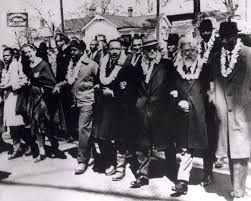The rebellion of Korach is a powerful and pivotal moment in Torah, as the leadership of Moses and Aaron is challenged by their cousin who proclaims that they have taken too much of the power for themselves, that all the people were holy, and Moses and Aaron are raising themselves up above the ‘kehal adonai’ the community of God.
With Datan and Abiram the sons of Eliav, and On the son of Pelet, all of them grandchildren of Reuben the oldest son of Jacob, Korach the great grandson of Levi, third son of Jacob and ancestor of Moses and Aaron, musters 250 men of stature – this is emphasised in the text: “n’si’ei eidah, k’ri’ei mo’ed, anshei shem – princes of the congregation, elect men of the community, men of renown”.
The testosterone level is so high in this story we can practically smell it. The clashing of antlers of the big beasts jousting for power and control. There might be a pretence about the need for all the people to be recognised as holy, but the reality is clear that this is a palace coup, and Moses doesn’t know what to do.
A great deal has been written about this, but I want to focus today on one of the more minor characters, On ben Pelet. Because while he is there at the beginning of the revolution he is missing from its denouement. And he doesn’t appear again. The other rebels go down into the yawning pit as the earth opens, On ben Pelet however simply disappears from history. Why?
The midrash provides a wonderful explanation. His wife gets involved. In this testosterone soaked challenge the men have essentially lost the plot. Where there are reasonable grounds for saying that Moses and Aaron have taken on too much of the leadership, there is no accountability and there is no transparency, the plotters went too far themselves, scenting regime change. It takes, in the view of the midrash, the calm and thoughtful intervention of the women we never really see (except as witnesses to the divine destruction of the hard line conspirators).
Talmud tells us this: (BT Sanhedrin 109b-110a)
“Rav said: On, the son of Pelet was saved by his wife. Said she to him, ‘What matters it to you? Whether the one [Moses] remains master or the other [Korach] becomes master, you will be nothing but a disciple.’ He replied, ‘But what can I do? I have taken part in their counsel, and they have sworn me [to be] with them.’ She said, ‘I know that they are all a holy community, as it is written, “seeing all the congregation are holy, every one of them. [So,]’ she proceeded, ‘Sit here, and I will save you.’ She gave him wine to drink, intoxicated him and laid him down inside [the tent]. Then she sat down at the entrance and loosened her hair. Whoever came [to summon him] saw her and retreated. Meanwhile, Korach’s wife joined them [the rebels] and said to him [Korach], ‘See what Moses has done. He himself has become king; his brother he appointed High Priest; his brother’s sons he made vice High Priests. If Terumah is brought, he decrees, Let it be for the priest; if the tithe is brought, which belongs to you [i.e., to the Levite], he orders, Give a tenth part of it to the priest. Moreover, he has had your hair cut off, and makes sport of you as though you were dirt; for he was jealous of your hair.’ Said he to her, ‘But he has done likewise!’ She replied, ‘Since all the greatness was his, he said also, Let me die with the Philistines. Moreover, he has commanded you, Set [fringes] of blue wool [in the corners of your garments]; but if there is virtue in blue wool, then bring forth blue wool, and clothe your entire academy with it. And so it is written, Every wise woman builds her house — this refers to the wife of On, the son of Pelet; but the foolish plucks it down with her hands — to Korach’s wife.”
The Talmudic midrash sees the minor figure of On ben Pelet, notices his disappearance by the end of the story, and pins this on the even more minor figures of “the wives”.
The unnamed wife of On ben Pelet is a politician to her fingertips. She can see that her husband is of lowly status and is never likely to amount to much. Whoever wins in the rebellion, he will never be an important part of the hierarchy. He isn’t much of a catch, one gets the feeling, but he is hers and she would rather he were alive than dead. Whether this is love or not is irrelevant, his fate would have repercussions on her status, she does not want to be the widow of a dissident – that would make her even more vulnerable than she is now.
So, in time honoured fashion, she gets him drunk. We think of Boaz and Ruth, of Noah and his daughters, of Yael and Sisera – when a woman wants to get a man pliant and to do her bidding it seems, the answer is to ply him with intoxicants. The drunken On ben Pelet is ushered into the tent to sleep it off. But this is still not enough to ensure he doesn’t rouse and put himself – and her – into danger. So she sits at the entrance with loosened hair – immodest, sexually charged, a terror to the scouts who may come to demand his presence. Like Rachel she uses her body to prevent anyone coming to search. And her husband slumbers on all unknowing.
On ben Pelet is, in the story, a nudnik, a schlemiel, scion of a great family maybe, but incompetent and easily led. He needs all the skills of his competent wife to survive. And it would be lovely if the midrash ended there. But no, the Talmud having decided on a verse in Proverbs (14:1) feels the need to explicate the other half of it.
“Every wise woman builds her house; but the foolish plucks it down with her hands.”
The wise woman here is clearly aligned with the wife of On ben Pelet, but who is the foolish wife? After all, 250 men joined Korach, Datan and Abiram in the failed rebellion.
It is interesting to me that the midrash decides that the parallel is with the wife of Korach – the main protagonist in this affair. And more than that, they give her great knowledge and legalistic reasoning – this is an educated woman able to debate and hold her point.
She begins first with the nepotism: Moses has made himself king. He has made his brother the High Priest, he has made his brother’s sons vice High Priests – something that is new to this text. Then when the Terumah offering is brought, it is immediately taken up by his own close family. This food (or oil or wine) can only be eaten by the Cohanim. Korach being only a Levite, is not permitted to have use of it.
Then she points out the tithing which would go to the Levites – Moses had set a limit of a tenth to go to the priests.
Then she moves on to the cut hair done as part of the purification rites. Before her husband can object she layers meaning over it – Moses was jealous of Korach’s lovely hair. He now laughs at him once the hair is cut off and Korach is, presumably, less attractive. No matter that Moses also had his hair cut according to Korach, his wife clearly believes that the impact on Moses was much less than that on her husband. Moses comes out the winner.
Now she moves onto ritual grievances. Moses had told them to wear blue threads on the fringes of their garments, but this is simply tokenistic in her eyes – if blue is to be worn as a mark of honour, then the whole garment should be blue. Otherwise, her reasoning seems to be, there is no real honour, just pretence, a token and perfunctory nod to the status of her husband; Korach is damned by faint praise and his wife notices.
She is painted as an intelligent and ambitious woman. Curiously she too seems to have the upper hand in the relationship – and she gives Korach the intellectual underpinnings for his challenge.
But her ambition for her husband is too much. He is not a strategist, not really a leader. Having made his alliances his own thirst for power comes through – why else would On ben Pelet feel uneasy having agreed to join the alliance? Korach cannot deviate from the path he is on. He doesn’t seem to realise that the atmosphere is changing, that his leadership is doomed.
His wife too is given no more voice. Who knows whether she had she would have been able to persuade her husband to reverse his challenge. Instead we see from the text that Datan and Abiram, their wives and children, stand at the doorways of their tents; And we see the earth opening and everything that pertained to Korach was swallowed up alive into the pit. The 250 men who were offering their own incense were destroyed by divine fire. Yet curiously Korach and his wife are not mentioned in the text as explicitly as Datan and Abiram were. Did Mrs Korach have one last trick up her sleeve? Did they melt away from the scene of destruction they had caused, in the hope of living to fight another day?

